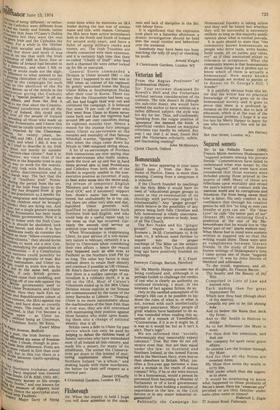Sir: Ms Merrily Harpur accuses me of being confused and, although
it is perhaps foolish to challenge the verdict of one who is clearly an authority on confused thinking, I must, in the interests of fact against fiction, do so. Only in the rarefied atmosphere of St George's Hill can it be possible to lay down the rules of what is, or what is not, normal with such intellectually arrogant assurance. Many people of great wisdom have hesitated to do so. I was reminded when reading this assertion of a remark of Tweedledurri, "Contrariwise, if it is so it might be, if it was so it would be; but as it isn't it ain't. That's logic".
We are informed that "socially homosexuals may reasonably expect tolerance." True. But they do not yet receive even that. Nor are they equal under the law: in Scotland and Northern Ireland, in the Armed Forces and in the Merchant Navy, even less so than elsewhere in Britain. What, justifies a five-year gap between a man and a woman in the realm of sexual consent? Why, if he or she were known to be a homosexual, would a person be prevented from becoming a Member of Parliament or of a local government authority or from holding a position of importance in the law, in the Civil Service or in any major industrial organisation?
Politically the Campaign for Homosexual Equality is taking action and they will be heard but whether they will be successful is extremely unlikely so long as this majority public opinion about what is normal prevails.
It is quite absurd to state that "the community knows homosexuals as people who drive taxis, write books, build roads, sit on juries, pay rates, etc" as if that amounted either to tolerance or acceptance. What the community knows is that homosexuals do all these things but it prefers not to know which of them is actually a homosexual. How many known homosexuals are invited to parties or to dinner on St George's Hill, I wonder?
It is painfully obvious from this letter that the writer has no practical knowledge of what goes on in the homosexual society and it goes to prove that there is a profound ig-' norance on the subject, due to lack of education, which is at the root of the homosexual problem. I hope it is not too late for Merry Harpur to learn: for one who knows it all this will be difficult.
Ian Harvey 28A Star Street, London W2


































 Previous page
Previous page